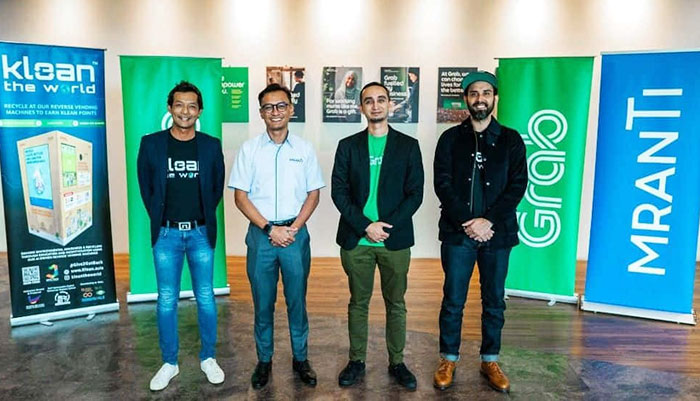Petaling Jaya, Malaysia – As Grab Malaysia continues to scale up its environmental sustainability efforts, the superapp has partnered with Malaysia’s reverse vending machine ecosystem, KLEAN, and the one-stop-shop for innovation commercialisation, Malaysian Research Accelerator for Technology and Innovation (MRANTI), to look at solutions that will responsibly recover and recycle single-use plastic with reverse vending machines (RVMs). This move aims to help encourage recycling and make it easier for consumers to contribute to a greener Malaysia.
Through this partnership, Grab and KLEAN will be rolling out AI-driven RVMs, at specific locations, where users can easily send their recyclable food packaging waste. In addition, Grab will be leveraging its platform to increase visibility, and drive consumer participation and education efforts. Meanwhile, MRANTI’s role in providing integrated facilities for end-to-end research, development, commercialisation, and innovation (R&D&C&I) services will assist in the enhancement of the AI on the RVMs, and will help accelerate the commercialisation of the product.
Hassan Alsagoff, Grab Malaysia’s country marketing head, shared that they seek to protect the environment as it is crucial to building resilient small businesses and strong communities that can thrive for generations to come.
“We will continue to collaborate with government bodies, corporate partners, and policymakers through various programmes, to tackle the challenge of climate change. Together we want to create a sustainable future and provide easy ways for our consumers to make greener choices in everyday decisions”, said Alsagoff.
KLEAN Reverse Vending Machines, which was launched in 2019 by JANZ Technologies Sdn Bhd, collect aluminium cans and plastic bottles, and sort on-site, while registering users and rewarding them with virtual points. These collected items are then smelted back into aluminium in the case of cans and recycled into Polyethylene terephthalate (PET) pellets and fibre in the case of plastic bottles by recycling partners within the KLEAN ecosystem.
Over the next few months, the partnership aims to look at developing more AI-driven RVMs, onboard more reward partners to its redemption platform, data collection and deploy the machines to various locations across the country for easier access.
Alsagoff added, “We believe that this is a small step in the right direction. We are committed to making a real sustainable and scalable impact in partnership with drivers, industry innovators, and governments. It’s the right thing to do for our communities, our cities, and the planet we all share.”
Joey Azman, KLEAN’s co-founder and chief financial officer, shared that they applaud Grab Malaysia’s commitment to recover back and promote recycling of single-use plastic alongside its aim to partner locally, as with the rising popularity of food and grocery deliveries, it is essential that they find ways to enable greater recycling of plastic waste.
“Partnerships and initiatives from corporations like Grab can help rally communities to adopt greener practices and contribute to positive change. We hope other companies will join us in our mission to improve the recycling habits of consumers through KLEAN’s own digital version of a ‘container deposit scheme,” said Azman.
Meanwhile, Dzuleira Abu Bakar, MRANTI’s CEO, noted that MRANTI is set to bridge the gap between public and private sector collaboration by connecting problem statements (demand) with solutions (supply) and increasing private sector participation, either through market access, investment, advisory, consultation, or providing testing and prototyping facilities.
“This project collaboration amongst the great minds of Grab and KLEAN is what we aim to nurture further within the ecosystem,” said Abu Bakar.

